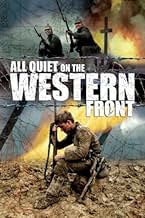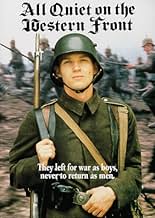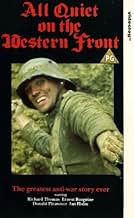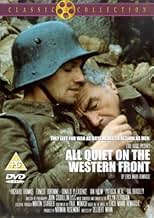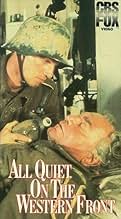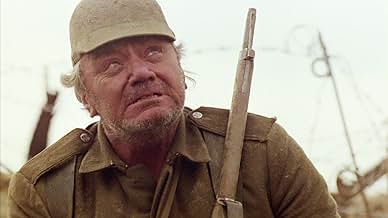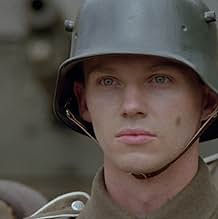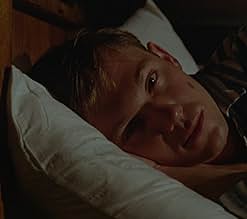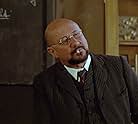IMDb RATING
7.1/10
11K
YOUR RATING
A young soldier faces profound disillusionment in the soul-destroying horror of World War I.A young soldier faces profound disillusionment in the soul-destroying horror of World War I.A young soldier faces profound disillusionment in the soul-destroying horror of World War I.
- Director
- Writers
- Stars
- Won 1 Primetime Emmy
- 2 wins & 6 nominations total
Paul Mark Elliott
- Josef Behm
- (as Mark Elliott)
David Bradley
- Albert Kropp
- (as Dai Bradley)
Matthew Evans
- Friedrich Muller
- (as Mathew Evans)
Marie-Noëlle Barre
- French Girl
- (as Marie Noelle-Barre)
- Director
- Writers
- All cast & crew
- Production, box office & more at IMDbPro
Featured reviews
This is a very good anti-war movie. It shows how the young and naive are being brain-washed to think that somehow it is their duty to kill and die. Big words like Fatherland, Kaiser, God, Patriotism. But it is always the young generation that does the dying, whilst the old men discuss strategy over a beer. War has lost whatever legitimacy it ever may have had when the leaders left the front line to lead from the back, safe in their headquarters miles away from the killing. Sending young boys to their death whilst claiming it is eventually for the Good is the ultimate cowardice. Some get their come-uppance, such as Cpl Himmelstoss, but most live their lives in the comfortable cocoon of their self-righteousness the school teacher, the father, the Kaiser himself.
But sometimes a young soldier sees through the scam, as when Paul kills a Frenchman by sheer instinct, only too late realising what he has been forced to do to someone who might have been his brother. But even then the cultural impregnation is too strong for him to follow his true human feelings and draw the only logical conclusion. And of course in the end he pays the price himself. Destroyed - for what?
That is the lesson that we all should take to heart, to this very day.
A very good film based on an exceptional book.
But sometimes a young soldier sees through the scam, as when Paul kills a Frenchman by sheer instinct, only too late realising what he has been forced to do to someone who might have been his brother. But even then the cultural impregnation is too strong for him to follow his true human feelings and draw the only logical conclusion. And of course in the end he pays the price himself. Destroyed - for what?
That is the lesson that we all should take to heart, to this very day.
A very good film based on an exceptional book.
The film is an excellent remake. Though in some ways it doesn't live up to the 1930 original, there are some other ways in which I think it is more effective. I particularly like the portrayals of Himmelstoss and Kat; Ernest Borgnine is outstanding in his role. Changes to the original are minor - Paul, for example, as an artist, drawing a bird in the final scene rather than reaching for a butterfly - and do not in any way detract from the power of Remarque's story.
Although the film, as released on video, is very good, it could still be made better...because...
I taped the program off of CBS when it ran on the "Hallmark Hall of Fame" in 1979 or 1980. The commercially available version leaves out some scenes which aired in the original broadcast. Himmelstoss, for example, DID appear as the postman in a street scene as the boys leave school. Unfortunately, this was apparently cut when the film was released on video. This film is actually somewhat better in its original, on-air form than on video...and if anyone associated with the current production rights read this, PLEASE restore it! After 22 years, the quality of my recording is declining markedly, but I don't want to lose the narrative quality of the film.
Although the film, as released on video, is very good, it could still be made better...because...
I taped the program off of CBS when it ran on the "Hallmark Hall of Fame" in 1979 or 1980. The commercially available version leaves out some scenes which aired in the original broadcast. Himmelstoss, for example, DID appear as the postman in a street scene as the boys leave school. Unfortunately, this was apparently cut when the film was released on video. This film is actually somewhat better in its original, on-air form than on video...and if anyone associated with the current production rights read this, PLEASE restore it! After 22 years, the quality of my recording is declining markedly, but I don't want to lose the narrative quality of the film.
Many people make the mistake of thinking of this movie as a remake of the 1930 film classic. In reality, both movies are a visual telling of the 1929 novel by the same name; at different points in time. This 1979 film is just a retelling of that story, and it's obvious from its differences from the 1930 film. Personally I like this version better...it's not overacted, it was filmed on location, it has a musical score, and it has a feeling of reality to it that the 1930 film just doesn't seem to have. No matter how many times I've watched it, the end always leaves me feeling as if I had been a part of the story and its effects linger with my being. Thanks Richard Thomas and crew
This version may not be as good as its great predecessor, but it's definitely a fine show on its own. Richard Thomas is very good, if about ten years too old, as the central character, Paul Baumer, who grows from glory seeking school boy to crusty veteran to, finally disillusioned, weary, almost hopeless pawn. Ernest Borgnine is terrific as Kat, the cagey survivor, who takes the youngsters under his wing, teaching them ways to make trench warfare almost tolerable. Ian Holm has a nice turn as Paul's town's postman turned training NCO, who later is transferred to the trenches. The great actress, Patricia Neal, shines in a cameo as Paul's mother. Donald Pleasance is excellent as Paul's patriotic teacher who exhorts Paul and his classmates to enlist. Gradually the grinding attrition of war eliminates Paul's classmates and the old sweats, until the famous final scene, when so little happened that day that the war entry was "All quiet on the Western Front." Most of the scenes in the original are presented here, a few additions and a couple deletions. The color cinematography is nicely done. Well worth a look as either a comparison or companion to the 1930 original.
The made for TV and 'remake' labels have tended to devalue All Quiet on the Western Front. With successors like Das Boot and Saving Private Ryan, it also seems less visionary now. However, All Quiet on the Western Front is a superb adaptation of Erich Maria Remarque's classic novel. The novel, published in 1929 by the 31 yr old Remarque was an instant classic. I remember reading it nearly two decades ago and its still one of the best books I've ever read. The Hollywood adaptation starring Lew Ayres - director Lewis Milestones greatest achievement - was very good as testified by its IMDb status. The remake is better! The remake is more intelligent, the cast is great and the period detail is extraordinary. The director - Delbert Mann - is an experienced veteran with classics like Marty to his credit. All Quiet is his magnum opus, released on TV because theatre owners didn't see it making any money. Naturally very few people watch message movies. Fewer still would make the effort to rent a "made for TV" film. Hardly anyone would watch this when they can see the original instead - a film with a more famous pedigree.
This adaptation is very faithful to the novel. Even with minor changes in the ending, the basic spirit of the book is retained. The cast is uniformly excellent with Richard Thomas playing the central role of Paul. Donald Pleasance, Ian Holm and Ernest Borgnine all give uniformly good performances in character driven and memorable roles. It could be said that Ernest Borgnine is too old and too fat to be a corporal. True, but on an emotional level be fits brilliantly into the role and his physicality really lends an element of humanity to him. The war scenes would rank very high in anyones list but for Saving Private Ryan's gritty realism. I loved the old German town from where Paul and his friends come. It looks straight out of the 1910's. All the period details are top notch. I strongly recommend watching this unheralded classic.
This adaptation is very faithful to the novel. Even with minor changes in the ending, the basic spirit of the book is retained. The cast is uniformly excellent with Richard Thomas playing the central role of Paul. Donald Pleasance, Ian Holm and Ernest Borgnine all give uniformly good performances in character driven and memorable roles. It could be said that Ernest Borgnine is too old and too fat to be a corporal. True, but on an emotional level be fits brilliantly into the role and his physicality really lends an element of humanity to him. The war scenes would rank very high in anyones list but for Saving Private Ryan's gritty realism. I loved the old German town from where Paul and his friends come. It looks straight out of the 1910's. All the period details are top notch. I strongly recommend watching this unheralded classic.
Did you know
- TriviaIn the scene of Kaiser Wilhelm II (Denys Graham) pinning medals on the soldiers, the Kaiser uses only his right arm and hand, while an aide holds the soldiers' tunics, an historically accurate detail, since the real Kaiser Wilhelm had a stunted and withered left arm that was virtually useless.
- GoofsThe Kaiser is not wearing the correct decorations. Apart from the fact that he is wearing ribbons rather than medals (Wilhelm II generally preferred medals to ribbons), one can actually see two of those ribbons sporting swastika-bearing eagles - clearly recycled props from a WW II movie.
- Quotes
Paul Baumer: [to a dying Frenchman] If we threw away the guns, the grenades... We could have been brothers, but they never want us to know that.
- Alternate versionsThe DVD release is the edited version which was shown in European theaters in the early 80s. Approximately 20 minutes of footage was cut from the original Hallmark Hall of Fame production which aired on American TV in 1979, including two scenes immediately following the award ceremony: the soldiers discuss the causes of the war in their billet while Himmelstoss listens in icy silence, and Paul and his friends admire and make lewd comments about a pretty girl on a theater poster. Also, the scene of Paul carrying the wounded Kat to the dressing station is greatly reduced, eliminating the rest stop and conversation in which Paul tries to give Kat his address.
- ConnectionsEdited into Hallmark Hall of Fame (1951)
Details
- Release date
- Countries of origin
- Official site
- Language
- Also known as
- All Quiet on the Western Front
- Filming locations
- Production companies
- See more company credits at IMDbPro
Contribute to this page
Suggest an edit or add missing content


